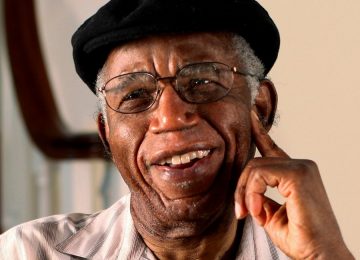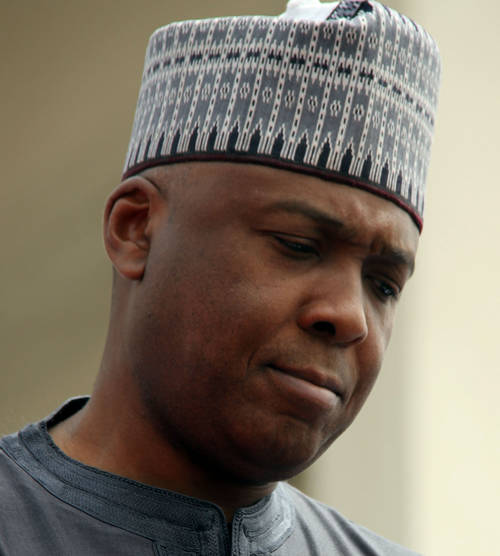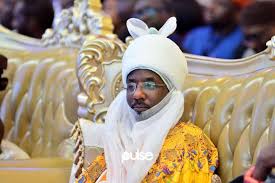A Nigerian researcher and associate professor at the University of Texas at Austin, United States, Prof Deji Akinwande, has been named by President Barack Obama among recipients of this year’s highest honour bestowed by the US government for science and engineering professionals in the early stages of their independent research careers.
Together with other 104 award recipients, Akinwande will receive the Presidential Early Career Awards for Scientists and Engineers in Washington DC later in the year.
The White House statement on the award reads: “President Obama today named 105** researchers as recipients of the Presidential Early Career Awards for Scientists and Engineers, the highest honor bestowed by the United States Government on science and engineering professionals in the early stages of their independent research careers. The winners will receive their awards at a Washington, DC ceremony this spring.
“These early-career scientists are leading the way in our efforts to confront and understand challenges from climate change to our health and wellness,” President Obama said. “We congratulate these accomplished individuals and encourage them to continue to serve as an example of the incredible promise and ingenuity of the American people.”
The man – Deji Akinwande
Dr. Deji Akinwande, according to his profile published by the University of Texas at Austin, received a PhD degree in Electrical Engineering from Stanford University in 2009, where he conducted research on the synthesis, device physics, and circuit applications of carbon nanotubes and graphene.
His Master’s research in Applied Physics at Case Western Reserve University pioneered the design and development of near-field microwave probe tips for nondestructive imaging and studies of materials.
He is currently an Associate Professor with the University of Texas at Austin. The current focus of his research explores materials and electronic systems based on 2D atomic layers. He is a co-inventor of a high-frequency chip-to-chip interconnect and an electrically small antenna for bio-electronics.
Awards
Prof. Akinwande has been honored with the inaugural IEEE Nano Geim and Novoselov Graphene Prize, the NSF CAREER award, the Army and DTRA Young Investigator awards, the 3M Nontenured Faculty Award, and was a past recipient of fellowships from the Ford Foundation, Alfred P. Sloan Foundation, and Stanford DARE Initiative.
He is one of the directors of the NASCENT ERC center at UT Austin. He recently co-authored a textbook on carbon nanotubes and graphene device physics by Cambridge University Press, 2011. His work on flexible graphene systems was selected as among the “best of 2012” by the nanotechweb online technology news portal and has been featured on MIT’s technology review and other technical media outlets.
About the Presidential Award
The Presidential Early Career Awards highlight the key role that the Administration places in encouraging and accelerating American innovation to grow our economy and tackle our greatest challenges. This year’s recipients are employed or funded by the following departments and agencies: Department of Agriculture, Department of Commerce, Department of Defense, Department of Education, Department of Energy, Department of Health and Human Services, Department of the Interior, Department of Veterans Affairs, Environmental Protection Agency, National Aeronautics and Space Administration, National Science Foundation, and the Intelligence Community.
These departments and agencies join together annually to nominate the most meritorious scientists and engineers whose early accomplishments show the greatest promise for assuring America’s preeminence in science and engineering and contributing to the awarding agencies’ missions.
The awards, established by President Clinton in 1996, are coordinated by the Office of Science and Technology Policy within the Executive Office of the President. Awardees are selected for their pursuit of innovative research at the frontiers of science and technology and their commitment to community service as demonstrated through scientific leadership, public education, or community outreach.
The newest recipients are:
Department of Agriculture
Renee Arias, National Peanut Research Laboratory
Matthew Thompson, Rocky Mountain Research Station
Kenong Xu, Cornell University
Department of Commerce
Nathan Bacheler, National Oceanic and Atmospheric Administration
Adam Creuziger, National Institute of Standards and Technology
Gijs de Boer, National Oceanic and Atmospheric Administration and University of Colorado-Boulder
Tara Lovestead, National Institute of Standards and Technology
Andrew Ludlow, National Institute of Standards and Technology
James Thorson, National Oceanic and Atmospheric Administration
Department of Defence
Pieter Abbeel, University of California-Berkeley
Deji Akinwande, University of Texas-Austin
Jin-Hee Cho, US Army Research Laboratory
Sarah Cowie, University of Nevada-Reno
Dino Di Carlo, University of California-Los Angeles
Alon Gorodetsky, University of California-Irvine
Elad Harel, Northwestern University
Patrick Hopkins, University of Virginia
Anya Jones, University of Maryland
Colin Joye, Naval Research Laboratory
Lena Kourkoutis, Cornell University
Jennifer Miksis-Olds, Pennsylvania State University
Timothy Ombrello, Air Force Research Laboratory
Heather Pidcoke, US Army Institute of Surgical Research
James Rondinelli, Drexel University
Bozhi Tian, University of Chicago
Luke Zettlemoyer, University of Washington
Department of Education
Christopher Lemons, Peabody College of Vanderbilt University
Cynthia Puranik, University of Pittsburgh
Department of Energy
Tonio Buonassisi, Massachusetts Institute of Technology
Milind Kulkarni, Purdue University
Keji Lai, University of Texas-Austin
Paul Ohodnicki, Jr., National Energy Technology Laboratory
Michelle O’Malley, University of California, Santa Barbara
Matthias Schindler, University of South Carolina
Jonathan Simon, University of Chicago
Michael Stadler, Lawrence Berkeley National Laboratory
Melissa Teague, Idaho National Laboratory
William Tisdale, Massachusetts Institute of Technology
Jonathan Hopkins, University of California, Los Angeles
Tammy Ma, Lawrence Livermore National Laboratory
David Mascareñas, Los Alamos National Laboratory
Department of Health and Human Services
Hillel Adesnik, University of California, Berkeley
Cheryl Broussard, Centers for Disease Control and Prevention
Samantha Brugmann, Cincinnati Children’s Hospital Medical Center
Namandje Bumpus, Johns Hopkins University
Jacob Carr, Centers for Disease Control and Prevention
Kafui Dzirasa, Duke University
Camilla Forsberg, University of California, Santa Cruz
Tina Goldstein, University of Pittsburgh
Viviana Gradinaru, California Institute of Technology
Jordan Green, Johns Hopkins University
Katie Kindt, National Institutes of Health
Andre Larochelle, National Institutes of Health
Jennifer Lorvick, RTI International
Courtney Miller, The Scripps Research Institute
Kiran Musunuru, Harvard University
David Pagliarini, University of Wisconsin – Madison
Sachin Patel, Vanderbilt University
Amy Ralston, University of California Santa Cruz
Carrie Reed, Centers for Disease Control and Prevention
Ervin Sejdic, University of Pittsburgh
Elizabeth Skidmore, University of Pittsburgh
Kay Tye, Massachusetts Institute of Technology
Muhammad Walji, The University of Texas School of Dentistry at Houston
Department of Interior
Richard Briggs, U.S. Geological Survey
Jeffrey Pigati, U.S. Geological Survey
Maureen Purcell, U.S. Geological Survey
Department of Veterans Affairs
Paul Marasco, Louis Stokes Cleveland VA Medical Center
Panagiotis Roussos, James J. Peters VA Medical Center
Erika Wolf, VA Boston Healthcare System
Environmental Protection Agency
Rebecca Dodder, EPA
Alex Marten, EPA
Intelligence Community
Kregg Arms, National Security Agency
Nicole Bohannon, Central Intelligence Agency
Ashley Holt, National Geospatial-Intelligence Agency
Jon Kosloski, National Security Agency
David Loveall, Federal Bureau of Investigation
Whitney Nelson, National Geospatial-Intelligence Agency
National Aeronautics and Space Administration
James Benardini, NASA Jet Propulsion Laboratory
Jin-Woo Han, NASA Ames Research Center
Michele Manuel, University of Florida
Andrew Molthan, NASA Marshall Space Flight Center
Colleen Mouw, Michigan Technological University
Vikram Shyam, NASA Glenn Research Center
National Science Foundation
Adam Abate, University of California at San Francisco
Marcel Agueros, Columbia University
Arezoo Ardekani, University of Notre Dame
Cullen Buie, Massachusetts Institute of Technology
Erin Carlson, Indiana University
Antonius Dieker, Georgia Tech Research Corporation
Erika Edwards, Brown University
Julia Grigsby, Boston College
Todd Gureckis, New York University
Tessa Hill, University of California – Davis
Daniel Krashen, University of Georgia
Rahul Mangharam, University of Pennsylvania
David Masiello, University of Washington
Daniel McCloskey, College of Staten Island, City University of New York
Shwetak Patel, University of Washington
Aaron Roth, University of Pennsylvania
Sayeef Salahuddin, University of California, Berkeley
Jakita Thomas, Spelman College
Joachim Walther, University of Georgia
Kristen Wendell, University of Massachusetts-Boston
Benjamin Williams, University of California-Los Angeles




